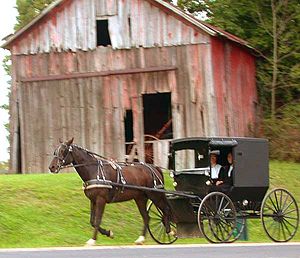I listen to Michael Savage on the radio on my drive home from work. This past week he called attention to a federal court case where the government sentenced a group of Amish people to prison terms ranging from 2 to 15 years for forcibly cutting the hair and beards of others in the community. And while sometimes Savage has a “the sky is falling!” attitude (hey, it gets him high ratings), he warned that Catholics in the United States shouldn’t ignore the implications of this case. If the federal government can sentence the Amish to 15 years for hair cutting, what’s to stop them from sentencing Catholics for praying in front of abortion clinics or speaking out in defense of traditional marriage?
 In a nutshell, the government convicted the defendants of a federal hate crime when a group of people, lead by Amish bishop Samuel Mullet Sr., organized a series of attacks on religious enemies and non-conforming family members by cutting men’s beards and women’s hair. The hate statute came into effect because the prosecution argued that because hair has a spiritual significance to the Amish, forcibly cutting it off constituted attacks targeting people based on their religious ideology. And the reason it was a federal case and not a local one is because the attackers used scissors brought from out-of-state thus invoking the ever so broad Commerce Clause.
In a nutshell, the government convicted the defendants of a federal hate crime when a group of people, lead by Amish bishop Samuel Mullet Sr., organized a series of attacks on religious enemies and non-conforming family members by cutting men’s beards and women’s hair. The hate statute came into effect because the prosecution argued that because hair has a spiritual significance to the Amish, forcibly cutting it off constituted attacks targeting people based on their religious ideology. And the reason it was a federal case and not a local one is because the attackers used scissors brought from out-of-state thus invoking the ever so broad Commerce Clause.
I’m not defending that what Mullet and his followers did was right. In fact, the local municipality should have convicted them and delivered whatever punishment anyone else would have received for those actions. I’m not a lawyer, but it sounds like some sort of misdemeanor assault charge to me. Their crime should have been the equivalent of someone forcibly cut someone’s hair as part of a college hazing ritual. That’s certainly not a federal case and definitely not worthy of a 15 year punishment!
Why should this case concern Catholics and other religious groups? If the federal government can involve itself in what should be a local case and start handing out 15 year prison sentences, then who is safe from the long arm of Washington D.C.? In a way, we can view this Amish case as a test for how the federal government can deal with groups that may oppose a particular agenda or piece of legislation. For example, if Catholics continue making more inroads in exposing the abortion industry and pushing for more pro-life legislation, maybe the federal government can round-up some people praying in front of abortion clinics and sentence them to federal prison time. Or what happens if someone who is very vocal about traditional marriage whips out a rosary in public? Maybe a little time in Club Fed will silence that person for a while and send a message to those who would say or do something similar. Do you see the dangerous territory we are heading in to when people in government (or influential lobbying groups) can turn anything into a federal hate crime case?
What RosaryMeds Do I Need?
 I think we need a good dose of meditation of the Fifth Sorrowful Mystery of the rosary, Jesus‘ Crucifixion. Remember, the Sanhedrin used the strong arm of the Roman empire to prosecute and crucify Jesus. And why? What heinous crime did Jesus commit? They put Jesus to death in order to silence a very outspoken critic who wasn’t following the pharisees’ agenda. Of course, their attempts failed when Jesus rose from the dead as we celebrate that event during this Easter season and when we pray the First Glorious Mystery of the rosary. Flash forward to early Christians who the Romans thought they could silence by feeding them to lions. That attempt also failed and Christianity not only survived, but flourished. Similarly, many who do not like the pro-life, pro-family views of today’s Catholics wish to “crucify” them in the media, social networks, and possibly using the strong arm of the federal government.
I think we need a good dose of meditation of the Fifth Sorrowful Mystery of the rosary, Jesus‘ Crucifixion. Remember, the Sanhedrin used the strong arm of the Roman empire to prosecute and crucify Jesus. And why? What heinous crime did Jesus commit? They put Jesus to death in order to silence a very outspoken critic who wasn’t following the pharisees’ agenda. Of course, their attempts failed when Jesus rose from the dead as we celebrate that event during this Easter season and when we pray the First Glorious Mystery of the rosary. Flash forward to early Christians who the Romans thought they could silence by feeding them to lions. That attempt also failed and Christianity not only survived, but flourished. Similarly, many who do not like the pro-life, pro-family views of today’s Catholics wish to “crucify” them in the media, social networks, and possibly using the strong arm of the federal government.
This Amish case and the Health and Human Services contraception mandate are the opening shots in a war to drive out religion from public consciousness. But Christians have a nearly 2000 year history of overcoming persecution. So even when it seems that we are beaten and at our weakest, like Jesus on the cross, we have more power in us than our persecutors. For their power is earthly. Our power is heavenly. And so we pray the rosary, meditate on mysteries like the Sorrowful Mysteries, and find that strength to not only endure what this world throws at us, but flourish.
Related articles
- Release denied for beard-cutting Amish man (upi.com)
- Appeal: Amish Convicts Given ‘Cruel, Unusual Punishment’ (fox8.com)
- Amish gather a last time before prison terms begin (foxnews.com)
- Convicted Amish in beard-cutting case fight for release (foxnews.com)
- Amish prosecuted because scissors ‘crossed state lines’ (wnd.com)

